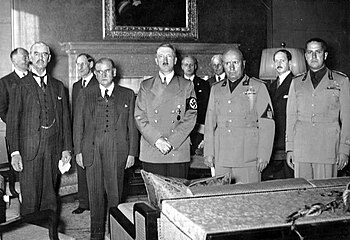綏靖
閱讀設定
(由綏靖主義跳轉過嚟)

綏靖(英文:Appeasement)係一個喺國際關係嘅外交政策,通常包括對一個有侵略性嘅政權,做一啲讓步嚟避免打仗[1]。呢個政策大多數代表住英國同法國喺1929-39年期間,針對墨索里尼同埋希特拉嘅外交政策[2]。呢個政策當時喺法國冇喺英國咁受歡迎[3]。
喺1930年代初期,當法西斯主義同納粹主義興起嘅時候,唔少人都因爲一次大戰嘅經歷而唔希望重蹈覆轍,所以比較偏向支持反戰主義。仲有,有啲人覺得梵爾賽條約對德國太嚴格而同情佢哋,亦有其他相信法西斯主義可以幫助反共產主義。到1938年,英國已經出現強烈反對綏靖嘅聲音,包括左右兩黨嘅唔少成員同埋唔少民眾。但係上層階級、英國皇室、同主流媒體等等,就仍然堅決支持用綏靖手法嚟維持和平[4]。當時嘅英國首相 張伯倫 喺簽咗慕尼黑協定之後,宣佈成功維持咗“我哋時代嘅和平”(英文:peace for our time)[5]。不過,唔到一年之後,納粹德國入侵波蘭,而英國跟住之後因爲咁而向德國宣戰,證明當時嘅綏靖政策未能夠保持長期嘅和平[6]。
到依家,唔同嘅學家都對呢個政策有唔同嘅睇法,有啲覺得係一個有時必需做嘅讓步,而其他就反對,相信對有侵略意圖嘅領袖做出任何嘅讓步,只會令事情更惡化。
睇埋
[編輯]出面網頁
[編輯] 維基同享中有關Appeasement嘅資源類
維基同享中有關Appeasement嘅資源類
攷
[編輯]- ↑ "Appeasement - World War 2 on History". www.history.co.uk. 歸檔時間4 April 2013.
{{cite web}}: CS1 maint: unfit URL (link) - ↑ Mallett, Robert (1997). "The Anglo‐Italian war trade negotiations, contraband control and the failure to appease Mussolini, 1939–40." Diplomacy and Statecraft 8.1: 137–67.
- ↑ Hucker, Daniel (2011). Public Opinion and the End of Appeasement in Britain and France. London: Routledge (2016出版). ISBN 978-1-317-07354-3. 喺12 October 2020搵到.
- ↑ Andrew Roberts, "'Appeasement' Review: What Were They Thinking? Britain's establishment coalesced around appeasement and bared its teeth at those who dared to oppose it", Wall Street Journal 1 Nov. 2019).
- ↑ Hunt, The Makings of the West p. 861.
- ↑ "State of Oregon: World War II - Isolation and Appeasement Fail". sos.oregon.gov. 喺2024-01-07搵到.
睇多啲
[編輯]- Barros, Andrew, Talbot C. Imlay, Evan Resnick, Norrin M. Ripsman, and Jack S. Levy. "Debating British Decision-making toward Nazi Germany in the 1930s." International Security 34#1 (2009): 173–98. online.
- Cole, Robert A. "Appeasing Hitler: The Munich Crisis of 1938: A Teaching and Learning Resource," New England Journal of History (2010) 66#2 pp. 1–30.
- Dimuccio, Ralph BA. "The study of appeasement in international relations: Polemics, paradigms, and problems." Journal of peace research 35.2 (1998): 245–259.
- Finney, Patrick. "The romance of decline: The historiography of appeasement and British national identity." Electronic Journal of International History 1 (2000). online; comprehensive evaluation of the scholarship
- Hughes, R. Gerald. "The Ghosts of Appeasement: Britain and the Legacy of the Munich Agreement." Journal of Contemporary History (2013) 48#4 pp. 688–716.
- Record, Jeffrey. "Appeasement Reconsidered – Investigating the Mythology of the 1930s" (Strategic Studies Institute, 2005) online
- Roi, Michael. "Introduction: Appeasement: Rethinking the Policy and the Policy-Makers." Diplomacy and Statecraft 19.3 (2008): 383–390.
- Strang, G. Bruce. "The spirit of Ulysses? Ideology and british appeasement in the 1930s." Diplomacy and Statecraft 19.3 (2008): 481–526.
- Van Tol, David. "History extension 2019: Constructing history case study: Appeasement." Teaching History 51.3 (2017): 35+.
- Walker, Stephen G. "Solving the Appeasement Puzzle: Contending Historical Interpretations of British Diplomacy during the 1930s." British Journal of International Studies 6#3 (1980): 219–46. online.
- Watt, D. C. "The Historiography of Appeasement", in Crisis and Controversy: Essays in Honour of A. J. P. Taylor, ed. A. Sked and C. Cook (London, 1976)
